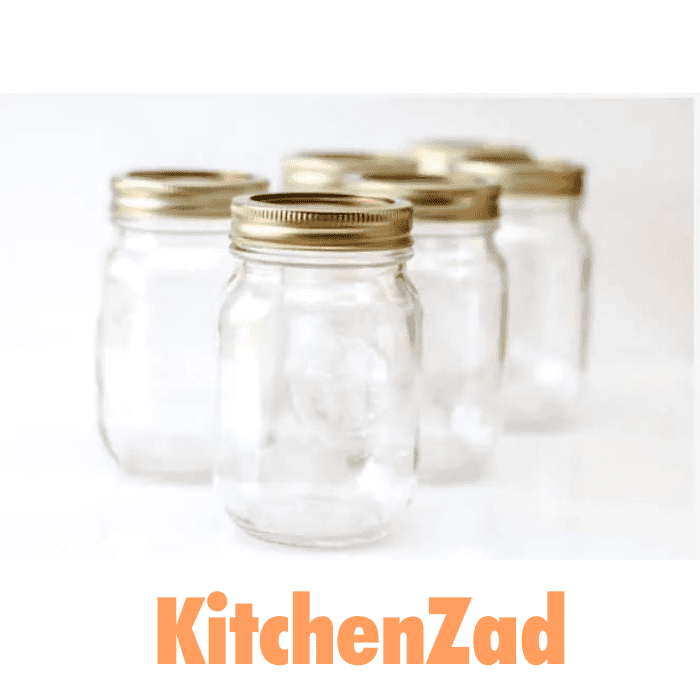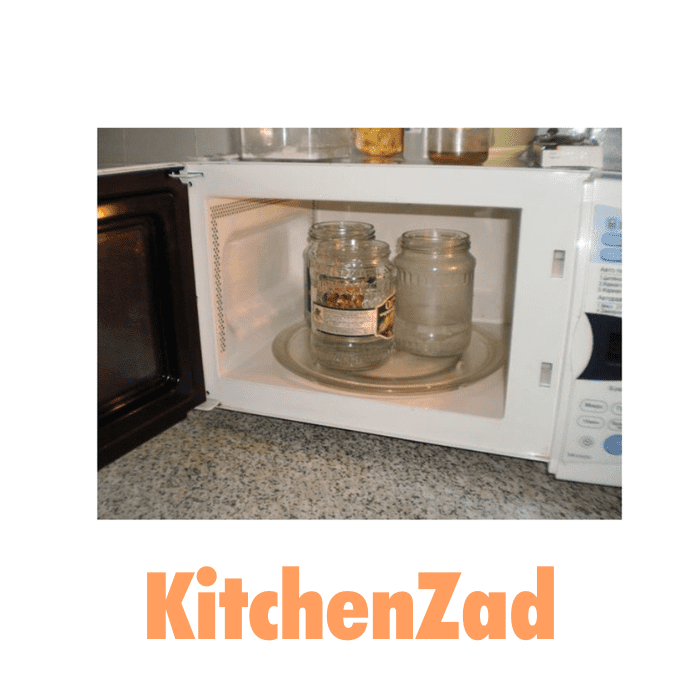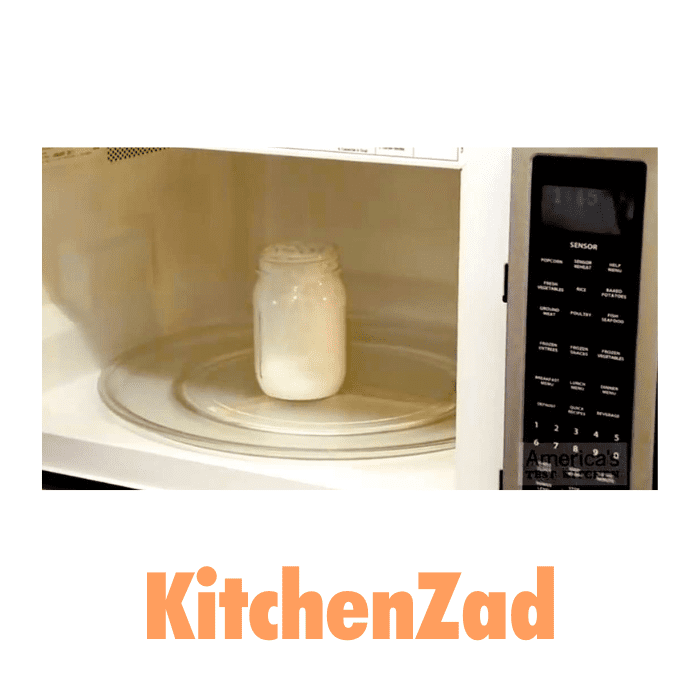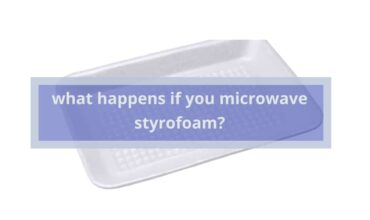Wondering if you can use mason jars in the microwave? Find out the answer here with full safety guidelines plus what materials to avoid.

Are Mason Jars Microwave-safe?
Yes, newer jars have a microwave-safe symbol on them.
For safety, you should verify that your jar is labelled as “microwave-safe” before putting it in the microwave.
If there’s no such certification, it’s best to avoid the microwave altogether.
Mason jar metal rings, lids, and caps should not be put in the microwave. Be sure to take out those parts before putting them in the microwave.
Be aware that older Mason jars may not be able to withstand high temperatures.
To avoid burning yourself, remember that glass mason jars can get very hot.
Therefore, it is advisable to avoid using mason jars for items that need longer microwave heating times.
Mason jars are suitable for heating ready-made foods like soup, pasta, cheese dips etc. which need low reheating time.
Can I use my Mason jar in the microwave? Test it to find out.
If you want an experiment to know whether it’s safe to use your Mason jar in a microwave or not, you can do a little test on it.
- To the Mason jar, add one cup of water
- Put it in the microwave.
- To ensure optimal heating, set the power level to its highest setting. Put the jar in the microwave for one minute.
- Carefully check the temperature of the jar after you take it out of the microwave.
- If a jar is hot, do not reheat it, and never put it in the microwave.
- When the jar is cool and confirmed to be microwavable, then you can warm up your food whenever you want.
It’s essential to make sure the entire container is at a cool temperature, even though the part close to the water may feel warmer.
Take caution when extracting the jar from the microwave. Make sure to use oven potholders or mitts to avoid injury from burning yourself.

Read also: What Is Microwave Grill Oven?
Extra Tips for Microwaving Mason Jars
- When canning food in Mason jars, take care not to place them on a cold or wet surface after they have been heated. To store in the refrigerator, allow the items to cool down on a towel or heat-resistant mat.
- A Mason jar makes an excellent coffee or tea thermos, but be sure to get a cosy for it as the glass can become just as hot as the beverage inside.
- It is highly dangerous to use a microwave with metal objects, as it can cause an explosion. Therefore, before putting anything in the microwave, make sure to remove the lid, cap or any metal components from the jar.
- For the best results, it’s recommended that you move the food from a sealed jar to another container before reheating it in the microwave.
- When removing the Mason jar from the microwave, be sure to wear protective oven mitts or potholders. This is highly important since it will be very hot, regardless of its safety from within the microwave.
What is the Maximum Time for Microwaving a Mason Jar?
Microwaving Mason jars are most frequently done to sterilize them or reheat food.
So, the first step is to make sure it is certified as microwavable.
Then, the second one is to identify the proper amount of time needed which will depend on its size.
- 1-2 minutes: the time required for sterilizing Mason jars less than 1 litre in size and for reheating pre-made food.
- 3-4 minutes: The recommended sterilizing time for Medium Mason jars with a capacity of 1-4 litres
- 5 minutes is the required time for sterilizing large Mason jars with a capacity of over 3 litres.
- Exceeding 5 minutes of microwaving with a Mason jar could cause it to break.
A short guide on how to sterilize a Mason jar in the microwave
- Prepare a mixture of warm water and soap. You can replace the soapy water with baking soda.
- Rinse the jar with the mixture to eliminate any dirt and debris.
- Fill the jar with water and then heat it in the microwave for the amount of time mentioned earlier.
Can you safely use mason jars to cook frozen food in the microwave?
When heating frozen food in a Mason jar, take precautions as the sudden change in temperature can cause the jar to shatter.
The jar temperature will quickly rise when heated in a microwave.

If the jar is exposed to extreme changes in temperature, it can lead to thermal shock, which can damage the glass.
Submerging a Mason jar with frozen food in a bowl of water is the most secure method for thawing it.
After you thaw the contents of the jar, change out the water every thirty minutes. Once that is finished, you can start heating up your food in the microwave.
If your business offers products that need to be frozen, you should include a disclaimer. This disclaimer must be informing customers not to defrost the items in the microwave when using mason jars.
Read also: Why Is My Microwave Not Heating-Here’s the fix!

Is it safe to freeze food in Mason jars?
When putting food in the freezer, it’s better to opt for plastic containers instead of glass ones.
Glass doesn’t handle pressure very well and may fracture and break if the structure is pushed too far.
To freeze food in a Mason jar, you have to leave the lid slightly open while placing it in the freezer until it begins to solidify.
Certain mason jars have a frozen line imprinted on the glass allowing users to know the maximum capacity for freezing purposes.
Generally, you should fill products to a level just below the jar’s collar.
This step is taken to prevent the glass from breaking due to the expansion of the product when frozen.
Mason jars are known for being freezable but can become more fragile in extremely cold temperatures.
Wrapping them in fabric or separating them with a layer of cloth will help keep them safe from damage while they’re in the freezer.
Frequently asked questions
Can mason jars be safely placed in a dishwasher?
Yes, you can put Mason jars in the dishwasher for cleaning.
Regular dishwashing, however, could scuff the surface. Hand-washing is recommended for older jars to maintain their appearance.
Is it safe to put mason jars in the oven?
No. Never put Mason jars in the oven.
National Center for Home Food Preservation has cautioned against using ovens to process food.
The reason behind this warning is:
1. The ovens’ inaccuracy in timing
2. Temperature fluctuations
3. Dry heat dangers
4. Increased chances of jars shattering.

What is the shelf-life of food stored in a Mason jar?
According to the National Center for Home Food Preservation, cool and dark places are preferred to can food in. This can help food stays fresh for up to 18 months.
Time is of the essence when it comes to food quality; the longer it sits, the more its condition will deteriorate.
Make sure to sort the Mason jars by expiration date and inspect the seal on each one to make sure the contents are in acceptable condition.
Can I fill a Mason jar with water previously boiled?
Yes, and Mason jars can be sterilized with boiling water by either pouring the water into them or submerging them in a pot of boiling water.
Before you take the step of submerging the Mason jars in water, you need to ensure the jars have already reached room temperature.
If the jar is cold, putting it suddenly into boiling water can cause it to break due to the sudden temperature change.
For optimal results, put your jar in the hot water as it is heating rather than waiting till it boils





